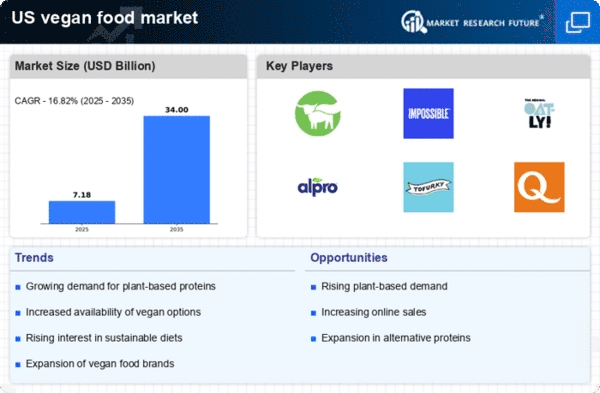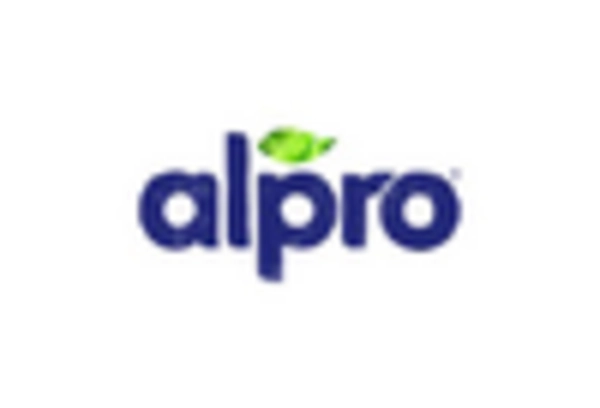Rising Consumer Awareness
The vegan food market is experiencing a notable surge in consumer awareness regarding health, environmental, and ethical issues associated with food choices. As individuals become more informed about the benefits of plant-based diets, the demand for vegan products increases. Recent surveys indicate that approximately 39% of consumers in the US are actively seeking plant-based options, reflecting a shift in dietary preferences. This heightened awareness is driving innovation within the vegan food market, as companies strive to meet the evolving needs of health-conscious consumers. Furthermore, educational campaigns and social media influence play a crucial role in shaping perceptions about veganism, thereby expanding the market's reach. As a result, businesses are increasingly investing in research and development to create diverse and appealing vegan food products, which is likely to further stimulate growth in the industry.
Growing Demand for Sustainable Packaging
Sustainability is becoming a critical factor in consumer purchasing decisions, particularly within the vegan food market. As environmental concerns rise, consumers are increasingly seeking products that utilize eco-friendly packaging solutions. Research indicates that 73% of consumers are willing to pay more for sustainable packaging, which is prompting companies to rethink their packaging strategies. This shift is not only beneficial for the environment but also enhances brand loyalty among eco-conscious consumers. The vegan food market is responding to this demand by adopting biodegradable, recyclable, and compostable materials for packaging. As businesses prioritize sustainability in their operations, it is likely that the industry will witness a significant transformation in packaging practices, further aligning with consumer values and expectations.
Technological Advancements in Food Production
Technological advancements are significantly impacting the vegan food market, enabling the development of innovative products that cater to diverse consumer preferences. Techniques such as precision fermentation and plant-based meat alternatives are revolutionizing food production, making it easier to create high-quality vegan options. For instance, the market for plant-based meat substitutes is projected to reach $27 billion by 2027, indicating a robust growth trajectory. These advancements not only enhance the taste and texture of vegan products but also improve their nutritional profiles, making them more appealing to a broader audience. Additionally, automation and improved supply chain logistics are streamlining production processes, reducing costs, and increasing efficiency. As technology continues to evolve, it is likely to play a pivotal role in shaping the future of the vegan food market, driving further innovation and consumer adoption.
Expansion of Retail Channels and Accessibility
The vegan food market is experiencing an expansion of retail channels, which is enhancing accessibility for consumers. Traditional grocery stores, specialty health food shops, and online platforms are increasingly offering a diverse range of vegan products. This trend is supported by data indicating that 45% of consumers prefer purchasing vegan items from mainstream retailers, reflecting a shift in shopping habits. The rise of e-commerce has also played a crucial role in making vegan products more accessible, allowing consumers to explore and purchase items from the comfort of their homes. As more retailers recognize the potential of the vegan food market, they are likely to expand their offerings, thereby catering to the growing demand. This increased accessibility is expected to drive further growth in the industry, as it encourages more consumers to incorporate vegan options into their diets.
Influence of Social Media and Celebrity Endorsements
The vegan food market is increasingly influenced by social media platforms and celebrity endorsements, which play a pivotal role in shaping consumer perceptions and preferences. Influencers and public figures who advocate for plant-based diets contribute to the normalization of veganism, making it more accessible and appealing to the general public. Recent data suggests that 60% of millennials are more likely to try vegan products after seeing them promoted by their favorite celebrities. This trend is fostering a vibrant community around veganism, encouraging individuals to explore plant-based options. As social media continues to evolve, it is expected that the impact of digital marketing on the vegan food market will grow, leading to increased visibility and sales for vegan brands. Consequently, businesses are likely to invest more in influencer partnerships and targeted marketing strategies to capitalize on this trend.
.png)















